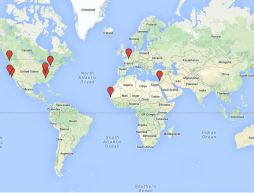|
Prawns. What are they good for? An article released by the University of California in Santa Barbara, written by Sonia Fernandez, argues that prawns – particularly African freshwater prawns – carry benefits far larger than their size would suggest: they may fight disease.
Researchers of The Upstream Alliance suspect the prawns play a role in controlling schistosomiasis, a chronic, waterborne disease caused by a parasitic flatworm. Schistosome parasites are transmitted through aquatic snails, an intermediate host, before infecting humans. Here’s where prawns come in: prawns prey on these snails, without becoming infected themselves. So, in an undisturbed ecosystem, prawns exert some control on schistosomiasis. The prawns grow larger than the shrimp you would find in the supermarket, but smaller than a lobster. Tan in color, with long, blue-tipped claws, the prawn is rich in protein and iron. Prawns can be a vital source of nourishment in impoverished sub-Saharan Africa. What’s more, The Upstream Alliance wants to use prawns’ inherent predatory nature to “devise the optimal win-win-win-win solution that benefits human health, environmental restoration, hunger alleviation and economic development,” said Susanne Sokolow, a researcher at Stanford University and UC Santa Barbara and co-director of The Upstream Alliance. When the schistosome parasite infects humans, it lays up to 3,000 eggs a day, hoping that those eggs will leave the body through feces or urine and make their way to the waterways. Instead up to half the eggs stay in the body to create adverse side effects. Schistosomiasis leads to poor physical health, an impaired immune system and cognitive difficulty. Schistosomiasis can be deadly but it does not always kill; it leaves its victims feeling weak and ill. In many parts of sub-Saharan Africa, dams, irrigation, or other manmade constructions disturb river ecosystems. The Diama Dam in Senegal demonstrates this clearly. The dam blocks the migration of river prawns, so few prawns are found upriver of the dam. Sure enough, without prawns to keep snail numbers low, schistosomiasis prevalence exploded after the construction of the Diama Dam. Removing the dam isn’t an option, so researchers are looking for other ways to reintroduce prawns to the Senegal River. Stocking aquaculture-raised prawns in Senegal will, Sokolow hopes, control disease, create a source of food, restore the biodiversity lost by the dam, and generate economic revenue for local people. The potential solution has caught outside attention. The National Science Foundation awarded $1.5 million to a team of researchers and scientists partnered through The Upstream Alliance. Members include Sokolow from Stanford, Armand Kuris and David Lopez-Carr from UC Santa Barbara, James Tidwell of Kentucky State University, and James Sanchirico of UC Davis. The Upstream Alliance has also received funding from the Bill & Melinda Gates Foundation and Grand Challenges Canada. Upstream will use their new resources to establish more prawn stocking sites to further assess the benefits of the crustaceans on disease, health, and economics. The researchers plan to take a multipronged approach that will include drug treatments and reintroduction of the prawns, surveys, monitoring, interviews and experiments that are expected to provide insights across various fields, including ecology, epidemiology, aquaculture, economics and other social sciences as well as mathematical modeling. Check back often to track our progress. |
The Upstream Alliance News and EventsNews feed about the activities, news, and events of The Upstream Alliance: Partners in Schistosomiasis Reduction Archives
August 2016
|

 RSS Feed
RSS Feed
